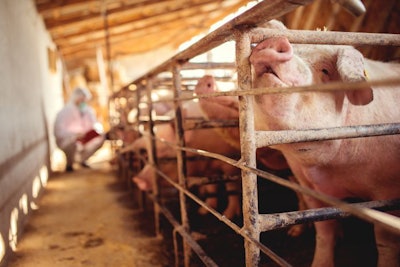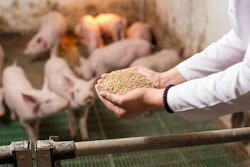
As Taiwan takes first steps towards the ending of vaccination against classical swine fever (CSF), its aim is to broaden the market for its pork exports.
In Taiwan, more than 300 pig farms have been selected to take part in a trial aimed at eventually regaining export markets for the territory’s pig meat.
After previous classical swine fever (CSF) outbreaks, Taiwanese pig farmers have been routinely vaccinating their animals against the disease. This has successfully prevented any outbreaks over the past 10 years. However, some countries do not accept imported animal products (including meat) from nations where vaccination is carried out as the practice can mask low-level infections.
If CSF vaccinations were no longer needed, Taiwan could export pork to more countries, said the deputy minister in the Council of Agriculture (COA) last week.
To test whether vaccination is still needed, approximately 20 pigs at each of the participating farms will not be administered the vaccine. According to Taipei Times, these unvaccinated animals are reared alongside vaccinated pen-mates, and observed closely for any signs of the disease.
Reared at around 150 farms, the first 3,000 of these “sentinel” pigs have so far shown no signs of CSF. When they reach slaughter weight, they will undergo further testing for CSF.
The trial phase is scheduled to continue until June 2022. If the pigs continue to be healthy, the COA will consider ending the need for vaccination against CSF.
Last year, the World Organization for Animal Health (OIE) declared most of Taiwan free of foot-and-mouth disease without vaccination, according to the same source. This opened the prospect of a resumption of Taiwanese pork exports if the same can be achieved with respect to CSF control.
CSF cases continue among Japan’s wild boar population
After a prolonged absence since 1992, CSF virus was detected in Japan again almost three years ago.
Based on official reports from the national veterinary authority to the OIE, 3,552 wild boar have tested positive for the CSF virus since that time. Cases have been recorded across at least 25 prefectures in four regions of the largest island, Honshu.
Last month alone, 88 new cases were found in the wild population in 14 prefectures. While the majority of these registered a handful of cases, Mie and Ibaraki each added more than 20 to their respective totals.
Since early in 2019, a program of vaccination of wild boar has been rolled out across Japan.
Two further outbreaks on Japanese farms
Japan’s latest CSF outbreak in domestic pigs was in early July. A few cases were detected among unvaccinated piglets at a farm in Sagamihara city. More than 4,100 pigs at the premises were culled, together with a further 145 at an epidemiologically linked farm, and more animals at a local slaughterhouse. In the prefecture — Kanagawa, near to the Greater Tokyo area — CSF vaccination is permitted and recommended for domestic pigs. Subsequent investigations revealed the infection to have been a wild strain of the CSF virus.
In mid-May of this year, Japan’s previous farm outbreak was confirmed. CSF virus-positive tests were returned from a farm in Chuo city. More than 20 of the 2,523 pigs at the premises died, and the rest were destroyed. Chuo city is in the prefecture of Yamanashi, which is in the Chubu region of central Honshu.
Latest outbreaks bring Japan’s total in domestic pigs since September 2018 to 69. Directly affected have been almost 239,000 pigs, which have been lost through mortality or culling.
Since October 2019, CSF vaccination has been recommended for domestic pigs in a growing number of prefectures.
In September 2020, Japan lost its status as free of CSF from the OIE. This change came after a two-year suspension of status, during which the disease could not be brought under control. To regain its previous disease-free status, all CSF vaccination must cease, followed by a period of 12 months without any new cases.
Bhutan, Brazil register new CSF cases
Across Asia in the Eastern Himalayas, the Kingdom of Bhutan registered two cases of CSF among its wild boar population in June. Bone marrow extracted from the carcasses of two long-dead animals tested positive for the CSF virus, according to the official OIE report. Previously, Bhutan had been free of this disease for three years.
In September 2020, first cases of CSF were recorded in Brazil after a one-year hiatus. Since then, 11 outbreaks have been reported to the OIE, involving almost 200 pigs. Of these, 103 died, and 96 were culled to prevent further spread of the infection.
All these latest outbreaks were among “extensive backyards farms” in the northeastern state of Piaui. This lies outside the country’s CSF-free zone.
More on CSF
Also known as hog cholera, CSF is a contagious viral disease of domestic and wild swine, according to the OIE. Caused by a Pestivirus, there is just one virus serotype. It infects only members of the pig family, and it does not affect humans. CSF presents in acute and chronic forms, and symptoms range from mild to high mortality. A notifiable disease, it is easily transmitted by direct or indirect contact with infected pigs or pig products.
CSF is found in some parts of Central and South America, Europe, Asia and parts of Africa. In several European countries, there were large outbreaks during the 1900s. Regions free of the disease are North America, Australia and New Zealand.
Also causing similar symptoms and mortality in members of the pig family is an unrelated virus, African swine fever.















